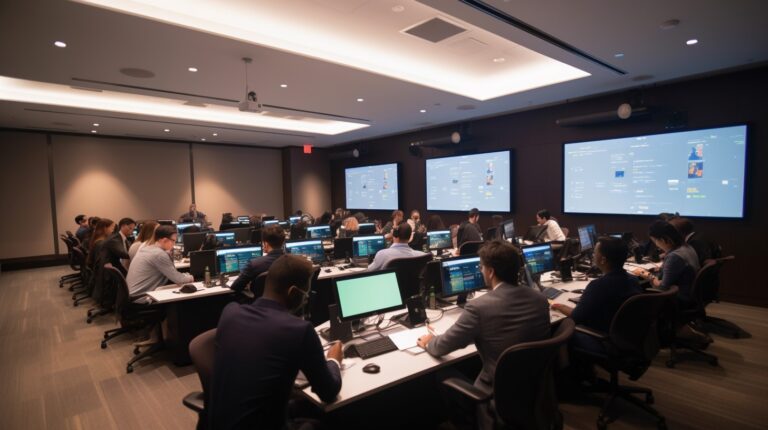Table of Contents
The Role of a PR Specialist
Public Relations (PR) specialists are vital players in shaping and sustaining the public image of businesses, individuals, and organizations. By adeptly managing communication channels and nurturing relationships with key stakeholders, PR specialists guide their clients through the complexities of public perception. Enhancing your PR strategy can be significantly impactful with the assistance of expert PR services.
What Does a PR Specialist Do?
A PR specialist is a communications professional responsible for handling the public image and reputation of their clients. Acting as a bridge between an organization and the public, they ensure the company’s message is consistent and effectively communicated across all channels. These professionals are skilled in crafting compelling narratives and fostering positive relationships with the media and the public.
PR specialists play a key role in:
- Developing Communication Strategies: Creating and implementing strategies to promote an organization’s brand, products, or services.
- Media Relations: Building and maintaining relationships with journalists and media outlets.
- Crisis Management: Preparing for and addressing potential crises to safeguard the organization’s reputation.
- Content Creation: Writing press releases, speeches, and social media posts.
The Importance of a PR Team
A well-organized PR team is crucial for executing comprehensive PR campaigns. These teams include various specialists, such as media relations experts, crisis communication specialists, and content creators, all collaborating to ensure a cohesive and effective communication strategy. Understanding what a PR team does highlights the need for diverse expertise in handling the multifaceted nature of public relations.
Key Differences: PR Specialist vs. Publicist
While PR specialists and publicists share some responsibilities, there are significant differences between the two roles. PR specialists manage an organization’s overall reputation and communication strategy, whereas publicists often focus on promoting specific individuals or events. This distinction is essential in understanding the broader scope of a PR professional’s duties compared to a publicist.
Essential Skills for PR Specialists
Success in the dynamic field of public relations requires a diverse skill set, including:
- Excellent Communication Skills: Proficiency in both written and verbal communication.
- Creativity: The ability to generate innovative ideas and strategies.
- Crisis Management: The capability to handle crises effectively and maintain a positive image.
- Media Savvy: Understanding how to engage with the media and secure favorable coverage.
How to Become a PR Specialist
Aspiring PR specialists typically need a bachelor’s degree in public relations, communications, or a related field. Gaining experience through internships or volunteer work, networking with professionals, and developing strong communication skills are crucial steps in building a successful career in PR.
Public relations specialists must continuously stay ahead of industry trends and adapt to new communication technologies. Discover the secrets to publishing your story in top media outlets with expert PR services.
What is a PR Specialist?

A PR specialist is a professional who handles the public image and reputation of their clients. They act as the middleman between the organization and the public, ensuring all messages are clear, consistent, and effectively communicated. This includes press releases, social media posts, speeches, and public appearances. The goal? To ensure that the client is always seen in the best possible light.
Key Tasks and Responsibilities
So, what does a PR specialist actually do day-to-day? Here’s a sneak peek:
- Creating Communication Strategies: They develop plans to promote their client’s brand, products, or services. This involves a lot of brainstorming and creativity to craft messages that will resonate with the target audience.
- Managing Media Relations: It is crucial to build and maintain good relationships with journalists and media outlets. A PR specialist must know who to talk to and how to get their client’s story in the news.
- Handling Crises: The PR specialist manages the situation when things go wrong. They create strategies to protect and repair the client’s reputation during a crisis.
- Content Creation: PR specialists are skilled writers, from writing press releases to creating social media content. They know how to craft compelling messages that grab attention and convey the right information.
Why PR Specialists Matter
PR specialists are essential in a world where public perception can make or break a business. They help clients navigate the often tricky waters of public opinion, ensuring their message is clear and heard. With them, businesses can maintain a positive image and effectively communicate with their audience.
Transform Your Brand with a Skilled PR Specialist
Looking to boost your brand’s visibility? Contact us today and see the difference we can make.
Key Responsibilities of a PR Specialist
A PR specialist, also known as a communications and public relations specialist, wears many hats to ensure the smooth operation of their client’s public image. Let’s dive into the essential duties that define this role and explore what a public relations specialist does on a daily basis.
Developing Communication Strategies
One of the core responsibilities of a PR specialist is to craft and implement communication strategies. This involves developing plans that promote the organization’s brand, products, or services. It’s about knowing the right message, the right time, and the right platform to reach the target audience effectively. Whether it’s a new product launch or a rebranding effort, PR specialists ensure that every piece of communication aligns with the overall goals and image of the organization.
Media Relations
Building and maintaining strong relationships with journalists and media outlets is crucial. PR specialists act as the bridge between the organization and the media, ensuring that the company’s story is told accurately and positively. This involves:
- Pitching stories to media outlets
- Arranging interviews with key personnel
- Preparing press kits
- Coordinating press conferences
A good PR specialist knows how to grab the media’s attention and generate favorable coverage.
Crisis Management
Every organization faces crises, and it’s the job of a PR specialist to manage these situations effectively. This includes:
- Preparing for potential crises by developing contingency plans
- Acting swiftly to mitigate damage when a crisis occurs
- Leading communication efforts during crises
- Ensuring that the organization’s response is clear, consistent, and calms public concern
Content Creation
Content is king, and PR specialists are adept at creating various types of content. They craft messages that engage and inform the audience through:
- Press releases
- Speeches
- Social media posts
- Blog articles
Each piece of content is tailored to fit the platform and the intended audience, ensuring that the organization’s voice is heard loud and clear.
Event Management
Organizing and managing events is another key responsibility. PR specialists ensure that everything runs smoothly, Whether it’s a press conference, product launch, or community outreach event. Their tasks include:
- Coordinating with different teams
- Handling logistics
- Managing the media presence
- Ensuring the event supports the organization’s goals and boosts its public image
The Vital Role of a PR Team in Business Success
A well-structured PR team is indispensable for executing comprehensive public relations campaigns. A PR team comprises various specialists, each bringing unique expertise to ensure a cohesive and effective communication strategy. Let’s explore why a PR team is crucial for any organization aiming to maintain a positive public image and navigate complex communication landscapes.
What Makes Up a PR Team?
A PR team is more than just a group of people working together; it’s a blend of diverse skills and specialties. Key members typically include media relations experts, crisis communication specialists, and content creators. Each member plays a vital role in crafting and delivering the organization’s message across different platforms.
- Media Relations Experts: These professionals build and maintain relationships with journalists and media outlets. Their primary role is to secure positive coverage and manage press interactions, ensuring that the organization’s message reaches the intended audience effectively.
- Crisis Communication Specialists: No organization is immune to crises. These specialists prepare for potential crises and develop strategies to address them swiftly and effectively. Their goal is to protect the organization’s reputation during challenging times.
- Content Creators: Content is king in the world of PR. Content creators write press releases, speeches, and social media posts. Their work ensures that all communication is consistent and aligns with the organization’s overall strategy.
Why is a PR Team Important?
A PR team is essential for several reasons. Firstly, the combined skills of various specialists enable the organization to handle all aspects of public relations efficiently. This holistic approach ensures that every part of the communication strategy is noticed.
Moreover, a PR team helps in:
- Maintaining Consistency: Consistent messaging across all platforms builds trust and reinforces the organization’s brand.
- Strategic Planning: PR teams develop and implement strategies that align with the organization’s goals. They are proactive in identifying opportunities to enhance the organization’s image.
- Effective Crisis Management: Having a crisis communication plan in place allows the organization to respond promptly and appropriately to adverse situations, minimizing potential damage to its reputation.
Our PR experts are here to help you navigate the complexities of B2B PR. Whether you need to build media relationships, manage a crisis, or create compelling content, we’ve got you covered. Explore how we can help you navigate the complexities of B2B PR with our B2B PR agency services.

PR Specialist vs. Publicist
When managing public perception, the roles of a PR specialist and a publicist often need to be clarified. However, understanding the distinctions between these two professions is essential for anyone navigating the world of public relations.
The Broad Scope of PR Specialists
A PR specialist is a communication expert who focuses on shaping and maintaining the overall reputation of an organization. They manage a wide array of tasks, including:
- Developing Communication Strategies: PR specialists craft comprehensive strategies to enhance the organization’s public image. This involves planning campaigns, creating messaging, and ensuring consistency across all communication channels.
- Media Relations: Building strong relationships with journalists and media outlets is a crucial part of a PR specialist’s job. They work to secure positive media coverage and manage press interactions.
- Crisis Management: When a crisis hits, PR specialists are the frontline defenders of the organization’s reputation. They prepare crisis communication plans and respond swiftly to mitigate any damage.
- Content Creation: PR specialists are skilled writers who produce press releases, speeches, social media posts, and other materials to convey the organization’s message effectively.
In essence, PR specialists are strategic thinkers and planners who oversee public relations efforts’ big picture.
The Focused Role of Publicists
Publicists, on the other hand, typically concentrate on promoting specific individuals, events, or products. Their primary goal is to generate media buzz and public interest. Key aspects of a publicist’s role include:
- Individual Promotion: Publicists often work with celebrities, authors, and public figures to enhance their public profiles. They arrange interviews, media appearances, and promotional events.
- Event Publicity: Publicists are essential for promoting events such as movie premieres, book launches, and charity galas. They aim to attract media attention and ensure the event is well-publicized.
- Media Outreach: Publicists spend significant time pitching stories to journalists, arranging coverage, and ensuring that their clients receive the desired media exposure.
While PR specialists manage an organization’s overall reputation, publicists zero in on specific projects or individuals to generate immediate public interest.
Why Understanding the Difference Matters
Knowing whether to hire a PR specialist or a publicist can make a significant difference for businesses and individuals seeking to enhance their public image. A PR specialist is the ideal choice if the goal is to build and maintain a long-term reputation. A publicist’s focused approach may be more effective for short-term projects or personal branding.
Elevate Your Brand with a Skilled PR Specialist
Ready to elevate your brand? Connect with us today and discover how strategic PR can make a lasting impact.
Essential Skills for PR Specialists
Mastering a diverse range of skills is essential to thrive as a PR specialist. These professionals must excel in communication, creativity, crisis management, and media engagement. Here’s a deeper look at each of these critical skills:
Communication Skills
A PR specialist must be proficient in both written and verbal communication. This involves crafting compelling press releases, delivering persuasive speeches, and writing engaging social media posts. Clear, concise, and effective communication is vital for maintaining a positive public image and ensuring the organization’s message resonates with its audience.
Creativity
Creativity is key in developing innovative PR strategies that capture attention and make a lasting impression. PR specialists must think outside the box to create unique campaigns that differentiate their clients from the competition. Creativity drives successful public relations, Whether through a clever social media campaign or an inventive public event.
Crisis Management
Handling crises effectively is a critical skill for any PR specialist. This involves preparing for potential issues, responding swiftly to unexpected events, and maintaining a calm and positive demeanor. Effective crisis management can protect an organization’s reputation and even turn a challenging situation into an opportunity for positive exposure.
Media Savvy
Understanding how to work with the media is crucial for PR specialists. This includes building relationships with journalists, pitching stories that will garner positive coverage, and handling media inquiries. A media-savvy PR specialist can secure valuable publicity and shape public perception in favor of their clients.
How to Become a PR Specialist
Are you interested in becoming a PR specialist? Great choice! This role is perfect for those who love communicating, strategizing, and building strong relationships. Here’s a straightforward guide to help you embark on this exciting career path.
Educational Requirements
Most PR specialists start with a bachelor’s degree in public relations, communications, journalism, or a related field. These programs provide a solid foundation in writing, media relations, and strategic communication. Courses often cover topics like:
- Media Writing: Learning to craft compelling press releases and media pitches.
- Communication Strategies: Understanding how to develop and implement effective PR campaigns.
- Crisis Management: Gaining skills to handle PR crises swiftly and efficiently.
Gaining Practical Experience
Experience is key in PR. Internships, volunteer opportunities, or part-time jobs in related fields can provide valuable hands-on experience. Look for positions that allow you to:
- Write Press Releases: Get comfortable with the formats and styles used in professional PR writing.
- Manage Social Media: Learn how to engage audiences and manage a brand’s online presence.
- Coordinate Events: Understand the logistics of planning and executing PR events.
Networking and Professional Development
Building a network is crucial in PR. Attend industry conferences, join professional organizations like the Public Relations Society of America (PRSA), and connect with experienced professionals. Networking can lead to job opportunities and mentorship, providing insights and advice that textbooks can’t offer.
Developing Essential Skills
Successful PR specialists possess a blend of soft and hard skills. Focus on developing:
- Communication Skills: Both written and verbal communication should be clear, persuasive, and engaging.
- Creativity: Think outside the box to create unique and effective PR strategies.
- Crisis Management Abilities: Stay calm under pressure and manage unexpected situations efficiently.
- Media Savvy: Build and maintain relationships with journalists and understand what makes a story newsworthy.
Staying Updated with Industry Trends
The PR industry is constantly evolving. Stay ahead by:
- Reading Industry Publications: Follow PR blogs, magazines, and news sites.
- Attending Workshops and Webinars: These can provide updates on the latest tools and techniques.
- Engaging in Continuous Learning: Consider advanced certifications or courses to enhance your expertise.
The Evolving Role of the PR Specialist
PR specialists are key to managing public perception, handling everything from media relations to crisis management. They develop strategies, create content, and ensure consistent communication. A strong PR team combines various skills to tackle the multifaceted nature of public relations.
Understanding the difference between PR specialists and publicists helps clarify their broader role in maintaining a long-term reputation versus promoting specific events or individuals. The essential skills for a PR specialist include effective communication, creativity, crisis management, and media savvy.
As the field of public relations evolves, staying ahead of trends and adapting to new technologies is crucial. PR specialists who keep learning and innovating will continue to succeed in shaping public perceptions.
Curious to learn more? Discover the secrets to getting your story published in top media outlets with our guide on get articles written about you.





